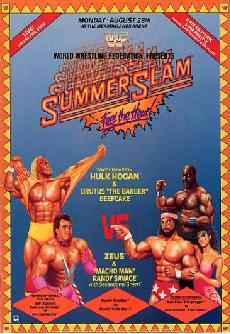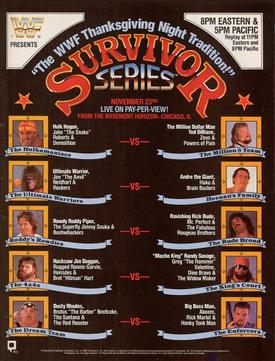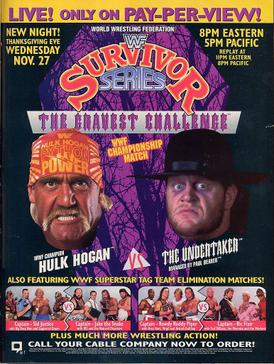
Robert Rudolph Remus, whose ring name is Sgt. Slaughter, is an American voice actor and retired professional wrestler. He is currently signed to WWE in the ambassador program.

Randy Mario Poffo, better known by his ring name "Macho Man" Randy Savage, was an American professional wrestler, rapper and former professional baseball player. He is best known for his time in the World Wrestling Federation and World Championship Wrestling (WCW).

Ray Washington Traylor Jr. was an American professional wrestler best known for his appearances with the World Wrestling Federation (WWF) under the ring name Big Boss Man, as well as for his appearances with World Championship Wrestling (WCW) as the Boss, the Man, the Guardian Angel, and Big Bubba Rogers. During his appearances with the WWF, Big Boss Man held the WWF World Tag Team Championship once and the WWF Hardcore Championship four times.

Warrior was an American professional wrestler and bodybuilder. Best known by his ring name The Ultimate Warrior, he wrestled for the World Wrestling Federation from 1987 to 1992, as well as a short stint in 1996. He also notably spent a few months in World Championship Wrestling (WCW) in 1998, in which he was known as The Warrior.

WrestleMania VI was the sixth annual WrestleMania professional wrestling pay-per-view (PPV) event produced by the World Wrestling Federation. It took place on April 1, 1990, at the SkyDome in Toronto, Ontario, Canada, marking the first WrestleMania to be held outside of the United States. The event had an announced attendance of 67,678, a record for the Skydome at the time. The main event of WrestleMania VI was "the Ultimate Challenge" — the main event match pitting WWF Champion Hulk Hogan against WWF Intercontinental Heavyweight Champion the Ultimate Warrior.

WrestleMania IX was the ninth annual WrestleMania professional wrestling pay-per-view (PPV) event produced by the World Wrestling Federation. The event took place on April 4, 1993, at Caesars Palace in the Las Vegas suburb of Paradise, Nevada. It was the first WrestleMania event held outdoors.

WrestleMania VII was the seventh annual WrestleMania professional wrestling pay-per-view (PPV) event produced by the World Wrestling Federation. It took place on March 24, 1991, at the Los Angeles Memorial Sports Arena in Los Angeles, California in the United States. Fourteen matches were shown during the live broadcast, with one dark match held before the event.

WrestleMania VIII was the eighth annual WrestleMania professional wrestling pay-per-view (PPV) event produced by the World Wrestling Federation. It took place on April 5, 1992, at the Hoosier Dome in Indianapolis, Indiana in the United States. Nine matches were shown during the live broadcast, with one dark match occurring before the event.

This Tuesday in Texas was a professional wrestling pay-per-view (PPV) event produced by the World Wrestling Federation. It took place on December 3, 1991, at the Freeman Coliseum in San Antonio, Texas. The event was an attempt by the WWF to establish Tuesday as a secondary pay-per-view night. Lukewarm reaction and a disappointing 1.0 buyrate rendered the experiment a failure, and the company shelved its plans until October 2004, when it held Taboo Tuesday.

The 1988 SummerSlam was the inaugural SummerSlam professional wrestling pay-per-view (PPV) event produced by the World Wrestling Federation. It took place on August 29, 1988, at Madison Square Garden in New York City, New York. The pay-per-view was created to help the company compete against rival promotion Jim Crockett Promotions. It was one of the first four annual pay-per-view events produced by the WWF, along with WrestleMania, the Royal Rumble, and Survivor Series, which were eventually dubbed the "big four".

The 1989 SummerSlam was the second annual SummerSlam professional wrestling pay-per-view (PPV) event produced by the World Wrestling Federation. It took place on August 28, 1989, in the Meadowlands Arena in East Rutherford, New Jersey. Ten matches were contested at the event, including one dark match held before the live broadcast.

The 1990 SummerSlam was the third annual SummerSlam professional wrestling pay-per-view event produced by the World Wrestling Federation. It took place on August 27, 1990, at The Spectrum in Philadelphia, Pennsylvania. The card consisted of 10 televised matches, including two main events. The Ultimate Warrior successfully defended the WWF World Heavyweight Championship against Rick Rude in a Steel Cage match, and Hulk Hogan defeated Earthquake by countout.

The 1992 SummerSlam was the fifth annual SummerSlam professional wrestling pay-per-view (PPV) event produced by the World Wrestling Federation. It took place on Saturday, August 29, 1992, at Wembley Stadium in London, England and aired on tape delay on Monday, August 31, 1992. It was the first major WWF pay-per-view to take place outside North America.

The 1992 Royal Rumble was the fifth annual Royal Rumble professional wrestling pay-per-view (PPV) event produced by the World Wrestling Federation. It took place on January 19, 1992, at the Knickerbocker Arena in Albany, New York. It centered on the Royal Rumble match, a modified battle royal in which participants enter at timed intervals instead of all beginning in the ring at the same time.

The 1991 Royal Rumble was the fourth annual Royal Rumble professional wrestling pay-per-view (PPV) event produced by the World Wrestling Federation. It took place on January 19, 1991, at the Miami Arena in Miami, Florida. It centered on the Royal Rumble match, a modified battle royal in which participants enter at timed intervals instead of all beginning in the ring at the same time.

The 1989 Survivor Series was the third annual Survivor Series professional wrestling pay-per-view (PPV) event produced by the World Wrestling Federation. It took place on Thanksgiving Day on November 23, 1989, at the Rosemont Horizon in the Chicago suburb of Rosemont, Illinois.

The 1990 Survivor Series was the fourth annual Survivor Series professional wrestling pay-per-view (PPV) event produced by the World Wrestling Federation. It took place on Thanksgiving Day on November 22, 1990, at the Hartford Civic Center in Hartford, Connecticut. Seven matches were contested at the event, including one dark match before the live broadcast.

The 1991 Survivor Series was the fifth annual Survivor Series professional wrestling pay-per-view (PPV) event produced by the World Wrestling Federation. It took place on Thanksgiving Eve on November 27, 1991, at the Joe Louis Arena in Detroit, Michigan. It was the first Survivor Series to feature a singles match of any kind, which served as the main event in which The Undertaker defeated Hulk Hogan to win the WWF World Heavyweight Championship. The undercard featured four traditional Survivor Series elimination matches.

The 1992 Survivor Series was the sixth annual Survivor Series professional wrestling pay-per-view (PPV) event produced by the World Wrestling Federation. It took place on November 25, 1992, at the Richfield Coliseum in Richfield Township, Ohio, which was the third time a Survivor Series was held there after the 1987 and 1988 events. It was the first Survivor Series to have only one match with the namesake elimination tag team match while the remaining matches were one-on-one and standard tag team matches.

No Holds Barred: The Match/The Movie was a professional wrestling pay-per-view (PPV) event produced by the World Wrestling Federation. The program aired on December 27, 1989, and consisted of the film No Holds Barred in its entirety, followed by a match previously recorded at a Wrestling Challenge taping on December 12 at the Nashville Municipal Auditorium in Nashville, Tennessee. It was one of the few pay-per-view events not made available for streaming at the launch of WWE Network service, although in 2018, the cage match became available as part of the WWE Supertape compilation in the service's Classic Home Video section.





















